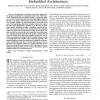Free Online Productivity Tools
i2Speak
i2Symbol
i2OCR
iTex2Img
iWeb2Print
iWeb2Shot
i2Type
iPdf2Split
iPdf2Merge
i2Bopomofo
i2Arabic
i2Style
i2Image
i2PDF
iLatex2Rtf
Sci2ools
111
click to vote
TVLSI
2002
2002
Low-power data forwarding for VLIW embedded architectures
In this paper, we propose a low-power approach to the design of embedded very long instruction word (VLIW) processor architectures based on the forwarding (or bypassing) hardware, which provides operands from interstage pipeline registers directly to the inputs of the function units. The power optimization technique exploits the forwarding paths to avoid the power cost of writing/reading short-lived variables to/from the register file (RF). Such optimization is justified by the fact that, in application-specific embedded systems, a significant number of variables are short-lived, that is, their liveness (from first definition to last use) spans only few instructions. Values of short-lived variables can thus be accessed directly through the forwarding registers, avoiding writeback to the RF by the producer instruction and successive read from the RF by the consumer instruction. The decision concerning the enabling of the RF writeback phase is taken at compile time by the compiler static...
Related Content
| Added | 23 Dec 2010 |
| Updated | 23 Dec 2010 |
| Type | Journal |
| Year | 2002 |
| Where | TVLSI |
| Authors | Mariagiovanna Sami, Donatella Sciuto, Cristina Silvano, Vittorio Zaccaria, Roberto Zafalon |
Comments (0)

